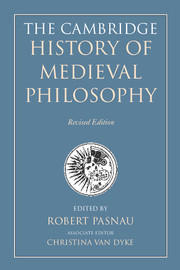Book contents
- Frontmatter
- Contents of Volume 1
- Preface
- List of contributors
- Frontmatter
- Contents of Volume 2
- Introduction
- I Fundamentals
- II Logic and language
- III Natural philosophy
- IV Soul and knowledge
- V Will and desire
- VI Ethics
- VII Political philosophy
- VIII Metaphysics
- IX Theology
- 50 Philosophy and theology
- 51 Faith and reason
- 52 Mysticism
- 53 Arguments for god’s existence
- 54 Describing god
- 55 Providence
- 56 The problem of evil
- Appendices
- Bibliography of primary sources
- Bibliography of secondary sources
- Index nominum
- Index rerum
- References
51 - Faith and reason
from IX - Theology
Published online by Cambridge University Press: 05 August 2014
- Frontmatter
- Contents of Volume 1
- Preface
- List of contributors
- Frontmatter
- Contents of Volume 2
- Introduction
- I Fundamentals
- II Logic and language
- III Natural philosophy
- IV Soul and knowledge
- V Will and desire
- VI Ethics
- VII Political philosophy
- VIII Metaphysics
- IX Theology
- 50 Philosophy and theology
- 51 Faith and reason
- 52 Mysticism
- 53 Arguments for god’s existence
- 54 Describing god
- 55 Providence
- 56 The problem of evil
- Appendices
- Bibliography of primary sources
- Bibliography of secondary sources
- Index nominum
- Index rerum
- References
Summary
The epistemology of religious belief, a central topic among medieval philosophers, shows no signs of disappearing from the public’s consciousness or the philosophers’ agenda. The reason why is not hard to find. Large-scale advances in science, rightly heralded as triumphs of reason, have been alleged to have implications for the rationality of religious faith: one need only think of the development of evolutionary biology in the past 150 years and of physical cosmology in the past fifty. Of course, the medieval philosophers knew nothing of evolutionary biology. And although they speculated about one big issue in physical cosmology – whether the world was created or has existed forever – their speculations were shaped not by experimental evidence but by Scripture and Aristotelian science. Nevertheless, it does not follow that medieval debates about faith and reason have been superseded. It may well be that contemporary debates on the relation between faith and reason would benefit from a fresh examination of medieval discussions.
PRELIMINARIES
A few preliminary, terminological remarks are in order, first about reason, then about faith. First, in theological contexts, reason is sometimes contrasted with divine revelation, especially when revelation is restricted in its application to doctrines alleged to be beyond the powers of human reason. There is a more expansive conception of reason according to which reason can discover on its own some items of revelation, but this chapter will exclude discussion of that possibility. Second, reason is sometimes distinguished from understanding. Reason, it is said, is discursive while understanding is intuitive. Reason is a capacity to construct, follow, and analyze arguments and hypotheses, whereas a person who has understanding of a particular topic grasps the topic immediately with no need (or, at least, no need any longer) to employ reason. Understanding occupies a Janus-like position with respect to reason: it can be either the foundation for reasoning or the consequence of reasoning.
- Type
- Chapter
- Information
- The Cambridge History of Medieval Philosophy , pp. 707 - 719Publisher: Cambridge University PressPrint publication year: 2014



